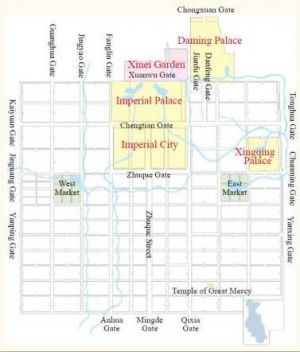Difference between revisions of "Tang Dynasty"
imported>Ciic m |
imported>Ciic |
||
| Line 2: | Line 2: | ||
[[File:Tang Dynasty figurine of a lady.jpg|thumb|Tang Dynasty figurine of a lady]] | [[File:Tang Dynasty figurine of a lady.jpg|thumb|Tang Dynasty figurine of a lady]] | ||
| − | [[File:Layout of Chang'an | + | [[File:Layout of Chang'an.jpg|thumb|Layout of Chang'an, capital city of the Tang Dynasty]] |
| − | .jpg|thumb|Layout of Chang'an, capital city of the Tang Dynasty | ||
| − | ]] | ||
[[category:history]] | [[category:history]] | ||
Revision as of 05:27, 15 March 2010
Peasant uprisings arose one after another in the late Sui Dynasty. In 617, Li Yuan in Taiyuan rose against the Sui, and captured Chang'an in the following year, establishing the Tang Dynasty. After his son Li Shimin succeeded to the throne, the Tang Dynasty developed quickly, both economically and militarily, bringing the country into a period of brilliance, known in Chinese history as the "Great Reign of Zhenguan." Later, Empress Wu Zetian and Emperor Xuanzong also made great administrative achievements that culminated into the "Great Prosperity of the Kaiyuan Years," during Emperor Xuanzong's reign. After the armed rebellion led by An Lushan and Shi Siming in 755, the Tang began to decline. The "Huang Chao Uprising" in 874 brought the Tang Dynasty to collapse. In 907 it was finally overthrown by the Later Liang Dynasty. The Tang Dynasty had 20 emperors and lasted 290 years.

